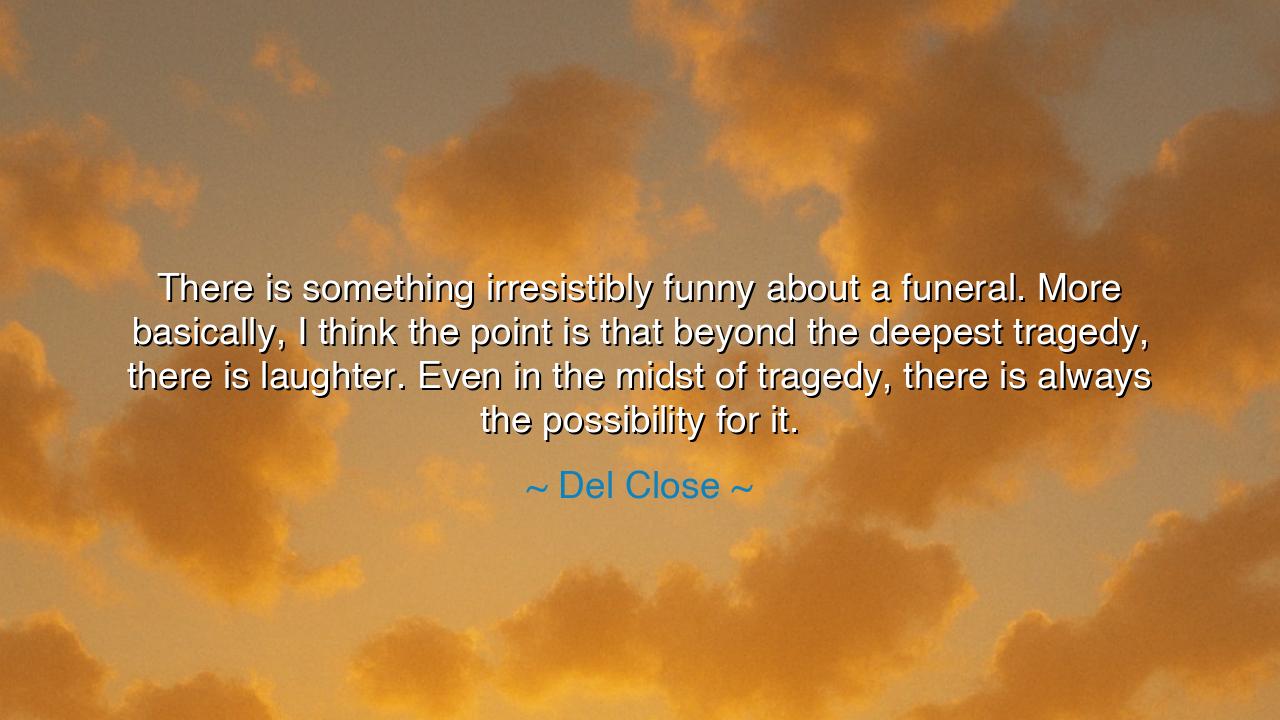
There is something irresistibly funny about a funeral. More
There is something irresistibly funny about a funeral. More basically, I think the point is that beyond the deepest tragedy, there is laughter. Even in the midst of tragedy, there is always the possibility for it.






The words of Del Close—“There is something irresistibly funny about a funeral. More basically, I think the point is that beyond the deepest tragedy, there is laughter. Even in the midst of tragedy, there is always the possibility for it.”—carry the paradox of the human spirit: that laughter and sorrow, though seeming opposites, spring from the same well of being. The ancients knew this truth well—that tears and laughter are siblings born of the same mother, life itself. Del Close, master of improvisation and philosopher of comedy, does not mock the solemnity of death; rather, he unveils the divine irony that life’s darkest hours can still give birth to light.
To find humour in tragedy is not to deny pain, but to transcend it. When the heart breaks, and yet the lips still find the courage to smile, something sacred occurs: the soul asserts its immortality. The funeral, that solemn rite of passage, becomes not merely a mourning of loss but a recognition of the absurdity and beauty of existence. Close’s insight is ancient in spirit—it echoes the wisdom of Stoic philosophers like Epictetus, who taught that suffering is inevitable but despair is optional. Even in sorrow, the wise find a way to laugh, for laughter is the rebellion of the living against the final silence of death.
Consider the story of Diogenes, the philosopher who lived in a barrel. When his friends lamented that he would die in poverty and obscurity, he told them to throw his body to the dogs, for he would no longer care. When they protested, asking if that was not dishonourable, Diogenes laughed and said, “Then give me a stick so I can beat them off!”—a joke about his own corpse. In that moment, he triumphed over death itself. Like Del Close, he saw that humour disarms tragedy, revealing its power to be only as strong as our fear allows. The human spirit that can laugh in the face of death is unconquerable.
Laughter beyond tragedy is not cruel, but cathartic. It is the soul’s way of saying, “I am still here.” Even at funerals, when grief saturates the air, a shared memory or a fond story can draw laughter that feels almost forbidden, yet healing. It is the heart remembering that the one who has gone once laughed too—and that laughter connects the living and the dead. Del Close, who dedicated his life to the craft of comedy, understood this not as jest, but as philosophy: that humour is the final proof of life’s endurance.
The ancients spoke often of the dual nature of existence—joy and pain, life and death, day and night. They believed that wholeness comes not from denying one for the other, but from embracing both. In Close’s words, we hear the echo of that same balance. He reminds us that laughter is not the enemy of mourning, but its companion. To laugh while grieving is not disrespect—it is human. For laughter is not always born of joy; sometimes it is the soul’s last defense against despair.
From this, we may take a profound lesson: do not fear to laugh in dark times. When tragedy comes—and it will—allow yourself the full measure of grief, but do not close your heart to the absurdities that still exist around you. Life does not stop being ridiculous simply because it has turned painful. To find humour in hardship is not to mock life, but to honour it—to say, “You have not broken me.” The warrior who can laugh while bleeding is not foolish, but free.
So, when the weight of sorrow descends upon you, remember Del Close’s teaching. Beyond the deepest tragedy, seek the spark of laughter, however faint. It may come as irony, as absurdity, or as a gentle memory that makes you smile through tears. Do not silence it. Let it speak, for it is the soul’s affirmation that even death cannot silence the pulse of joy.
For in the end, the lesson of his words is eternal: laughter is the echo of life that death cannot claim. It is the light that seeps through cracks in the coffin, the defiance of the mortal heart that knows it was born to feel deeply—and to laugh, even as it weeps. So walk boldly through your sorrows, and when the world is darkest, let your laughter rise like dawn. It is not disrespect to life—it is its most sacred hymn.






AAdministratorAdministrator
Welcome, honored guests. Please leave a comment, we will respond soon